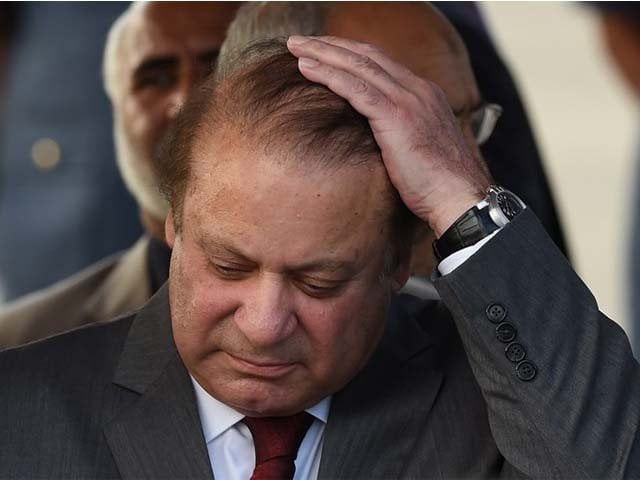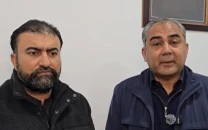Price of Avenfield flats ‘not cited in judgment’
NAB quizzed over Sharifs’ suspension petitions

prosecution’s case was based on the contention that Sharif was the actual owner while Maryam was the beneficial owner of these London flats.
PHOTO:FILE
This was divulged by the counsel for former Prime Minister Nawaz Sharif.
Subsequently, IHC grilled the National Accountability Bureau (NAB) about evidence that connected the jailed former PM and others with the London properties while resolving to conclude arguments in a few days in petitions filed on behalf of the Shairfs, seeking suspension of sentences.
The IHC bench, comprising Justice Athar Minallah and Justice Miangul Hassan Aurangzeb, directed Sharifs’ counsels, Khawaja Haris and Amjad Pervaiz, to conclude arguments by Aug 15.
Meanwhile, the court ordered NAB’s Deputy Prosecutor-General Sardar Muzaffar Abbasi to finalise his arguments by Aug 16.
Both were also directed to submit their arguments in writing.
IHC reconstitutes bench to hear Sharifs’ plea
Contending that the prosecution had failed to ascertain the actual price of Avenfield Apartments, Sharif’s counsel Haris said that the judgment did not mention this or who purchased the properties from whom.
“Your argument carries a lot of weight. If the cost of purchase is neither in record nor in evidence, how the provision (under) which the accused were convicted has been attracted?” Justice Minallah asked.
Haris said the case against the Sharifs had nothing to do with the properties as they were in the name of two offshore companies – Nielson and Nescoll – and Sharif’s son Hussain Nawaz is the owner of the properties.
He explained that the prosecution’s case was based on the contention that Sharif was the actual owner while Maryam was the beneficial owner of these London flats.
“How can they [the NAB] proceed without mentioning the value of the assets?” Haris said.
Justice Minallah observed that NAB had not challenged Sharifs’ acquittal under Section 9 (a) (4), which “is equal to accepting that he is not corrupt, dishonest or acquired assets through illegal means”
“The whole trial was conducted and Sharifs were given a clean chit under this section,” he said.
“In the truest sense, you (NAB) are saying that “the man [Sharif] is not corrupt but made properties through corruption,” Justice Minallah said.
He said that when NAB had ‘open-heartedly’ admitted that Sharif was not corrupt and it did not challenge his acquittal in one section, what is left to say.
“Is Maryam a benami or dependent,” Justice Aurangzeb asked. “Both,” Abbasi replied. “How can she be both,” the judge inquired, adding “could a daughter be convicted under Section 9(a)(5)” because she was not a public office holder.
NAB opposes transferring pending references against Sharifs
Abbasi replied that she was the beneficial owner of properties and accused of producing bogus documents in the case.
“If a public office holder makes property in the name of a three-year-old child, would that child be convicted?” Justice Minallah asked.
Abbasi replied that in this case, the child was an 18-year-old.
“I have just given an example,” the judge shot back.
Justice Minallah told Abbasi that the trial court clearly stated that Maryam was not the owner but only assisted her father.
“The case has a certain background, officials of six institutions had a role in (its) investigation and we should look into it as well,” Abbasi said.
“One can’t be convicted on presumptions,” the judge said.
“We have proved our case,” Abbasi contended.
“You have proved it, but the court has not stated it in its judgment and now you can’t say that the court has given a wrong decision,” Justice Minallah responded.
At one point, Justice Minallah inquired Haris if there was something on record connecting Sharif with the properties. In response, Haris said: “Nothing” and read several portions from the deposition of NAB’s key prosecution witness Wajid Zia in which he admitted that Sharif was in no way connected with the acquisition of properties nor had any correspondence with any institution.
He, however, said that the trial court did not even mention all that in the judgment. Moreover, he said, Sharif’s children had contended since the start that Sharif had nothing to do with these assets and their grandfather looked after everything, including their pocket money.
When the court asked if the sons’ connection with the father was enough for the conviction, Haris replied in the negative.
Subsequently, Justice Minallah observed that assets were the same, but the accused had been acquitted under Section 9(a)(4) yet convicted under section 9(a)(5).
“You [NAB] admitted that the man is honest,” he said.
“How could NAB (now) claim that he committed corruption and made any property when it did not challenge his acquittal under Section 9(a)(4).”
At one juncture, Justice Aurangzeb remarked that the correlation between the two sections was enormous and that “one doesn’t stand without the other”.
Abbasi, however, insisted that both sections dealt with “separate offences”.
Avenfield verdict – delivered through the washroom window
Justice Aurangzeb reiterated his warning to the media, urging it to be “very careful in reporting” the proceedings.
Interestingly, when petitions were taken up on Monday, the court told both parties that it would not proceed unless they agreed that the bench was impartial.
The petitioners’ lawyers and NAB’s prosecutor said that they reposed full confidence in the court.
Disagreeing with NAB’ contention that the court should not hear the petitions, the court said that appeals against the July 16 judgment had already been fixed for hearing.
“Your objection has become infructuous,” Justice Minallah said.
When Abbasi said that such petitions could not be heard six months after the judgment, Justice Minallah said acknowledging this argument was right would amount to accepting that all high courts were deviating from the law.
The hearing was later adjourned till August 15.


















COMMENTS
Comments are moderated and generally will be posted if they are on-topic and not abusive.
For more information, please see our Comments FAQ